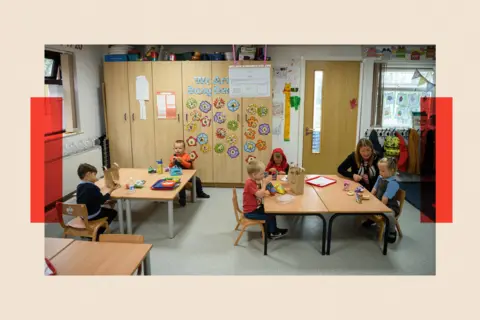

 BBC
BBC"We have the one of the most expensive systems in the world… today I want to reform our childcare system". These words, spoken by the then-chancellor Jeremy Hunt in the 2023 Spring Budget, were a beacon of hope for thousands of parents paying an average of almost £15,000 a year to nurseries and childminders.
The promise was to "transform the lives of thousands of women" and "build a childcare system comparable to the best".
Two years on, the rollout of what's commonly known as the "free hours" scheme in England is almost complete. From September, eligible working parents will be able to access 30 hours of childcare per week during term-time (for 38 weeks), paid for by the government, for their children from the age of nine months to four.
Only it hasn't been the panacea that many had hoped, and there are a number of hurdles still to overcome.
Parents say nursery places are increasingly difficult to find. And experts are concerned that a gap is widening between those who are eligible for the funded hours, and those who are missing out on the childcare revolution. So why has this challenge been too great for successive governments to solve?
Over the last five years, access to childcare in England has declined. At the same time demand is increasing.
The government estimates that by September, an additional 70,000 extra places and 35,000 staff will be needed to cope with the influx of families wanting spaces and more hours.
A report by the regulator and inspector of early years, Ofsted, found that deprived areas that have lower than average incomes are disproportionately affected by persistently low access to childcare.
Doncaster is a "childcare desert", defined as an area where parents have faced low childcare accessibility over time. There are 17 childcare places there for every 100 children.
For Jordan Parker from Doncaster, the funded hours have been an "absolute godsend". Her two-year-old daughter Riley goes to nursery one day a week. Finding a place however has been increasing tricky.
"I have to set off at 5am for work and her Dad steps in for some mornings but he's a farmer so he works long hours, seven days a week, so I don't think we'd manage without family help."
 Vanessa Clarke/BBC
Vanessa Clarke/BBCOlena Mykhaylyk says she put her daughter on the nursery list the moment she found out she was pregnant. "It's crazy you have to be thinking that far ahead," she says.
"It's great the government offers these hours but if you can't use them, they become negligible."
Childcare places increased by 44,400 between 2023 and 2024, but from September, many families will look to increase nursery hours as the number they are eligible for doubles.
Education Secretary Bridget Phillipson has conceded that parents in some areas may not be able to get their first choice childcare place in September. "It is no secret that childcare in England has often been expensive and hard to find," Phillipson has previously said.
"This issue is historic, and in some places it is far worse than in others."
One of Labour's lead pledges last year was to create 100,000 additional childcare places and more than 3,000 new nurseries in schools.
Analysis by think tank, the Institute for Fiscal Studies (IFS), says it will increase the share of school-based provision from around 22% to 27% of the market, which is "not nothing", says the IFS's associate director Christine Farquharson. But she adds that is "not going to be transformational".
It will also apply more to older children because it is easier for school-based settings to cater for three-year-olds, she adds.
The Department for Education (DfE) said 1,200 schools had approached them about opening one. But that is still short of the number needed.
 Getty Images
Getty ImagesSome 300 nursery schools were approved for funding in this first round, which the government says will create 6,000 new places in total. Of these, 4,000 will open in September.
Avnee Morjaria, associate director at the Institute for Public Policy Research (IPPR), who worked for the DfE when the expansion programme was being developed, says the school-based nursery programme is a "glimmer of hope".
"If they are delivered and delivered well, I think that has got a lot of potential. It just makes sense in terms of communities and schools and nurseries being the hub of their communities to have that kind of policy."
But for now, the system is still heavily reliant on private nurseries.
There are more than 20,000 private and voluntary nurseries in the UK, which provide most early years places, but many are unhappy with the current situation and some are struggling to make the funded hours scheme work.
Purnima Tanuku, executive chair of National Day Nurseries Association (NDNA), says most providers are facing "huge increases" in their operating costs from April, including statutory wage increases, changes to national insurance contributions and rising utility bills.
The government says it is increasing its funding for all pre-school children to reflect the wage increases and is providing an additional £75 million grant for nurseries to expand.
But some nurseries say the money they receive for three-and-four-year olds is not enough and they can no longer subside it with the money parents pay for younger children - as from September the state will be paying for 80% of childcare in England.
 Vanessa Clarke/BBC
Vanessa Clarke/BBCThe DfE is also clamping down on nurseries charging for extras, such as meals, snacks and nappies. Its updated guidance says that nurseries are entitled to ask parents to pay for such extras - but these charges must be clear and are voluntary.
This is causing "enormous stress," claims Ms Tanuku.
"We can't give out meals for free" one nursery owner told me, "we just don't know how this is going to work".
Some nurseries have threatened to pull out of the scheme altogether.
But Phillipson says that "despite the inherited challenges", they are pressing ahead "with the investment and leadership needed to support families and make sure that every child, regardless of background, can access the high-quality early education they deserve".
In the meantime, local authority-run nurseries are continuing their long term decline. The BBC has found that 23 council-run nurseries, 16 Sure Start centres and 12 maintained nursery schools, which offer funded hours, are either under review, being privatised or in the process of closing across England.
Staffing was one of the main reasons given. Finding suitable trained staff remains a real problem for the sector.
The cost of childcare in the UK remains one of the highest in Organisation for Economic Co-operation and Development (OECD) countries, for many parents who cannot access the free hours.
To qualify for the new hours, all adults in a household must be working and earn more than £9,518 but less than £100,000 per year.
David from London was devastated to find out that he and his wife were not eligible for the free hours. His wife is retraining to be an occupational therapist so they aren't classed as a "working family". And London and the East of England have the highest childcare costs in England.
"We just assumed we were eligible and didn't think for a second we wouldn't be," he says. "It's just the unfairness of it… it seems to be a huge oversight.
"The NHS does offer a bursary but we are having to use our savings and are paying £20,000 a year now on childcare. It's a huge disincentive to retraining and to a lot of people it would be prohibitive."
The government says there is a range of support for students in further or higher education.
 PA
PACoram Family and Childcare's annual report, which looks at the cost of childcare, warned that families who aren't eligible, are not in work, or who do not earn enough to be eligible are now paying an average of around £5,000 a year more than families who do have access, for a part-time place for a child under two.
This raises questions, according to the report, about whether disadvantaged children have the same opportunities as their more affluent peers.
Research by IPPR with Save the Children found that the childcare expansion is at risk of not delivering for those families. Only a third of the poorest families use formal childcare, compared to almost three quarters of the highest earning households.
"The government is in a really tough spot," says Ms Morjaria. "They have this kind of legacy policy that the Conservative government have chosen to fund and it clearly leaves out a section of young children and gives access to those with working families.
"Is it a gap widening policy? Of course it is, particularly where you think about early childcare as early education, because there is a really substantial proportion of young children not receiving that."
The government's other ambition is for 75% of children to reach a "good level of development" at the end of reception, by 2028. (This includes skills like being able to follow instructions in maths and literacy.)
The figure was 67.7% in 2023 to 2024. Phillipson has said "giving every child the best start in life is my top priority, and integral to our mission to ensure tens of thousands more children are school ready every year".
The poorest children have access to 15 hours a week of free childcare during term-time when they are two, but children of working parents will have access to 30 hours from nine months.
"That's quite difficult", says Ms Farquharson. "It is that disadvantaged group that's precisely those most vulnerable children [who] you want to target and support."
 Getty Images
Getty ImagesIn the Shirecliffe area of Sheffield, Meadows Nursery opened during the pandemic in joint venture with the local school, Sheffield Hallam University and charity, Save the Children.
The idea was to help children who were already behind and give parents access to spaces. "A private nursery would not have opened here in a million years", claims Claire Carroll, who is head of nurseries at the university.
Most of the children in the 40-place setting are two and three, and receive 15 hours a week of free childcare. "We find many of them haven't reached their physical milestones," she says.
"They might live in a one bedroom flat with six people in it and no balcony, they haven't got a garden to run around in and the local parks are run down and not necessarily safe."
She believes that it is vital to give this group of children more access to free childcare.
The Dfe has announced "the largest ever uplift to the early years pupil premium, increasing the rate by over 45%", so the most disadvantaged children are accessing the high-quality early years education they need, a spokesperson said.
The government is doubling the amount it spends on childcare to help parents back into the workplace. By 2026, it will cost around £8bn. But the system is under strain.
What it needs is the right staff and enough places to make it work. Helping children reach a good level of development is also vital, according to many of those experts.
Phillipson has been clear: "every child, regardless of background" should be able to access high-quality early education.
It remains to be seen how the system will cope from September.
However Farquharson believes the government's dual aims – around growth and child development - are trying to solve different problems.
"We're doubling the amount that we spend on free childcare in England," she warns, "[and] when you make that kind of a policy commitment, there's always going to be a risk of unintended consequences."
Top picture credit: Getty Images
BBC InDepth is the home on the website and app for the best analysis, with fresh perspectives that challenge assumptions and deep reporting on the biggest issues of the day. And we showcase thought-provoking content from across BBC Sounds and iPlayer too. You can send us your feedback on the InDepth section by clicking on the button below.